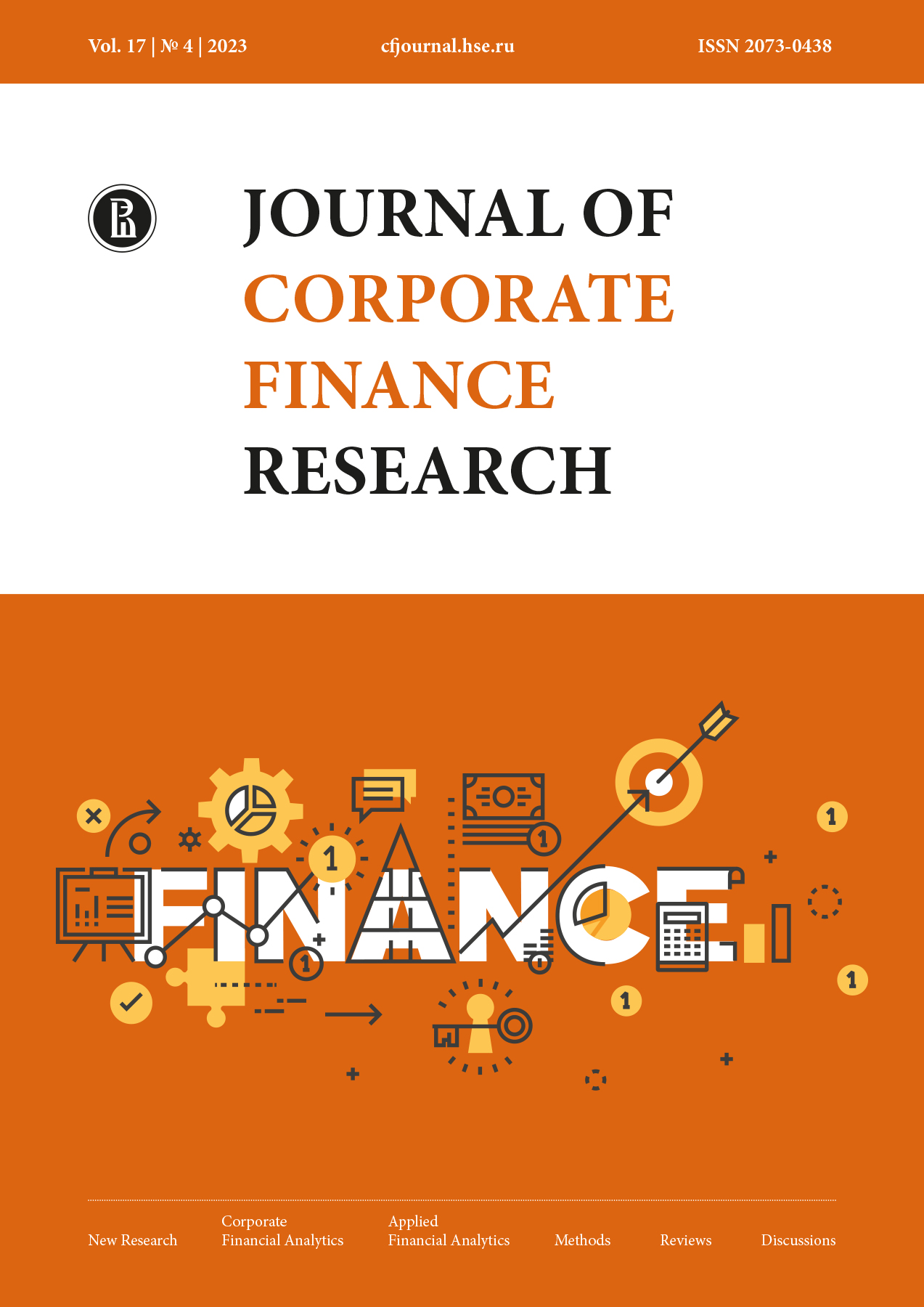Dividend Policy of Russian Companies: Cancel Culture Effect
Abstract
The paper is dedicated to the dividend policy of Russian companies under the sanctions pressure applied by the USA and the EU, which especially intensified in 2022 as a result of the changed global geopolitical environment. Cancel culture was used against Russia, complicating the financial, investment and operating activity of domestic companies. In the paper we analyze a sample of 73 Russian listed companies from non-banking sectors and 317 observations for 2017–2022. We consider the impact of sanctions against companies, boards of directors and CEOs on the company dividend policy. We used a logistic regression as a model to determine the probability of influence of changes in the studied variables on the decision concerning dividend payment. The sample is divided into two parts: 2017–2020 and 2021, and it illustrates companies’ behavior when the political environment in the world was stable and when the situation was aggravated. The research showed that sanctions against boards of directors and direct limitations of company’s operations had a negative influence on the probability of dividend payments while sanctions against CEO in the period of aggravation of political risks produced a positive effect. The cancel culture effect, i.e., the refusal of the USA and EU to cooperate with Russia and sanctions imposed on it, produced a significant negative effect on dividend payout by Russian companies.
Downloads
References
Izryadnova O.I., Kovaleva M.A. Dynamics of the domestic market in 2022: development potential and the impact of sanctions. Ekonomicheskoe razvitie Rossii= Russian Economic Developments. 2022;29(7):15-20. (In Russ.). URL: http://www.iep.ru/files/RePEc/gai/recdev/r2258.pdf (accessed on 12.01.2023)
Subbotina M.V. Cancel culture: a manifestation of social justice or a new way of manipulation. Obshchestvo: sotsi-ologiya, psikhologiya, pedagogika= Society: Sociology, Psy-chology, Pedagogics. 2022;3(95):34-37. (In Russ.) https://doi.org/10.24158/spp.2022.3.5 DOI: https://doi.org/10.24158/spp.2022.3.5
Nikitin A.V., Orlinskaya O.M., Sedaev P.V., et al. Cancel culture: reasons for development challenges in Russia. Vlast’ (The Authority). 2022;30(3):65-69. (In Russ.) https://doi.org/10.31171/vlast.v30i3.9046 DOI: https://doi.org/10.31171/vlast.v30i3.9046
Number of international sanctions imposed worldwide as of January 12, 2023, by target country. URL: https/www.statista.com/statistics/1294726/number-of-global-sanc-tions-by-target-country/f (accessed on 12.01.2023).
Overview of Sanctions against Russia, 2022. INTELLECT Law Firm. URL: https://www.intellectpro.ru/en/press/works/obzor_deystvuyushih_sanktsiy_v_otnoshenii_ros-sii/( accessed on 06.05.2022).
Specially Designated Nationals And Blocked Persons List (SDN) Human Readable List. URL: https://ofac.treasury.gov/specially-designated-nationals-and-blocked-per-sons-list-sdn-human-readable-lists(accessed on 09.05.2023).
Review of the key indicators of professional participants of the securities market. Bank of Russia. (In Russ.) URL: https://cbr.ru/Collection/Collection/File/43826/review_secur_22-Q4.pdf (accessed on 10.02.2023).
Report: Record Dividends in Russia // SBER CIB URL: https://dokhodchivo.ru/russia-dividends-fin?ys-clid=lgo74zmzbb548729508 (accessed date: 02.2022).
Fama E.F. Agency problems and the theory of the firm. Journal of Political Economy. 1980;88(2):288-307. DOI: https://doi.org/10.1086/260866
Federal’nyi zakon ot 26.12.1995 N 208-FZ (red. ot 04.08.2023) “Ob aktsionernykh obshchestvakh” [Federal Law On Joint-Stock Companies of 26.12.1995 No. 208-FZ] (In Russ.)
Miller M.H., Rock K. Dividend policy under asymmetric information. The Journal of Finance. 1985;40(4):1031-1051. https://doi.org/10.1111/j.1540-6261.1985.tb02362.x DOI: https://doi.org/10.1111/j.1540-6261.1985.tb02362.x
Bhattacharya S. Imperfect information, dividend policy, and ‘the bird in the hand’ fallacy. The Bell Journal of Econom-ics. 1979;10(1):259-270. https://doi.org/10.2307/3003330 DOI: https://doi.org/10.2307/3003330
Mueller D. A Life Cycle Theory of the Firm. Journal of Industrial Economics. 1972;20(3):199-219. https://doi.org/10.2307/2098055 DOI: https://doi.org/10.2307/2098055
Elmagrhi M.H., Ntim C.G., Crossley R.M., et al. Corpo-rate governance and dividend pay-out policy in UK list-ed SMEs: The effects of corporate board characteristics. International Journal of Accounting & Information Man-agement. 2017;25(4):459-483. https://doi.org/10.1108/IJAIM-02-2017-0020 DOI: https://doi.org/10.1108/IJAIM-02-2017-0020
Criteria for Defining Independence of the Board Members (Supervisory Board). Moscow Exchange. URL: https://www.moex.com/a3056 (accessed on 10.02.2023).
Khan A. Ownership structure, board characteristics and dividend policy: evidence from Turkey. Corporate Gover-nance. 2022;22(2):340-363. https://doi.org/10.1108/CG-04-2021-0129 DOI: https://doi.org/10.1108/CG-04-2021-0129
Yarram S.R., Dollery, B. Corporate governance and fi-nancial policies: Influence of board characteristics on the dividend policy of Australian firms. Managerial Finance. 2015;41(3):267-285. https://doi.org/10.1108/MF-03-2014-0086 DOI: https://doi.org/10.1108/MF-03-2014-0086
Rajput M., Jhunjhunwala S. Corporate governance and payout policy: evidence from India. Corporate Governance. 2020;19(5):1117-1132. https://doi.org/10.1108/CG-07-2018-0258 DOI: https://doi.org/10.1108/CG-07-2018-0258
Tahir H., Masri R., Rahman M.M. Impact of board attri-butes on the firm dividend payout policy: evidence from Malaysia. Corporate Governance. 2020;20(5):919-937. https://doi.org/10.1108/CG-03-2020-0091 DOI: https://doi.org/10.1108/CG-03-2020-0091
Ntim C.G., Opong K.K., Danbolt J. Board size, corporate regulations and firm valuation in an emerging market: a simultaneous equation approach. International Review of Applied Economics. 2015;29(2):194-220. https://doi.org/10.1080/02692171.2014.983048 DOI: https://doi.org/10.1080/02692171.2014.983048
Boumosleh A., Cline B.N. Outside director stock options and dividend policy. Journal of Financial Services Research. 2015;(47):381-410. https://doi.org/10.1007/s10693-013-0174-2 DOI: https://doi.org/10.1007/s10693-013-0174-2
Ghasemi R.S., Madrakian H., Keivani F.S. The relationship between the corporate governance and the stock institu-tional ownership with the dividend - a case study of Teh-ran. Journal of Business and Management. 2013;15(2):65-69. https://doi.org/10.9790/487X-1526569 DOI: https://doi.org/10.9790/487X-1526569
Copyright (c) 2023 National Research University Higher School of Economics

This work is licensed under a Creative Commons Attribution-NonCommercial-NoDerivatives 4.0 International License.

